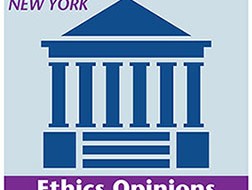Ethics Opinions from Other Jurisdictions
[Originally published in NYPRR April 2002]
Ohio: Agreement By Law Firm to Pay ‘Promotion’ Fee to Real Estate Agency
An Ohio law firm proposed to pay an annual fee to a real estate agency and to discount its fees to the agency’s customers in exchange for the agency’s promotion of the law firm to its customers. Neither the law firm nor the agency was compelled to use the other’s services, but neither could enter into a similar agreement with anyone else. Under the proposal, the law firm would deduct $100 from its normal closing fees or give free consultation services to any client referred by the agency.
The proposal was rejected by the Ohio Supreme Court Board of Commissioners on Grievances and Discipline. Op. 2002-1. The Board concluded that the law firm’s participation in the agency’s program would violate the Ohio disciplinary rules forbidding lawyers to pay anyone for recommending their services; prohibiting law partnerships with non-lawyers; dictating against business transactions between lawyer and client if their interests differ; preventing lawyers from asking anyone to recommend or promote their services; and discouraging lawyers from accepting employment if their professional judgments might be affected by their own interests.
The Board cited the possibility that the law firm might be influenced by its interest in securing enough referrals from the agency to justify the cost to it of the annual fee it proposed to pay to the agency.
The defects in the proposal could not be cured by client consent, even after full disclosure.
Connecticut: Screening Not Effective to Prevent Imputation of Conflict
A Connecticut lawyer did personal injury defense work for Firm A. He recently moved to Firm B. At the time, Firm B was representing several plaintiffs in the same actions in which Firm A was representing the defendants. The lawyer himself had worked on three of these cases.
On these facts, Firm B was required to ask: (1) During the lawyer’s term with Firm A, had Firm A represented clients whose interests were materially adverse to the interests of clients of Firm B on substantially related matters; and (2) If so, had the lawyer acquired information about those clients of Firm A which was protected under the rules defining client confidences and secrets.
The answer to question 1 was yes, since the two firms had represented opposing plaintiffs and defendants in several actions. The answer to question 2 was also yes, at least with respect to the three cases on which the lawyer had worked and which Firm B was now handling. With respect to these three cases, Firm B could proceed only if the clients involved waived the conflicts. Firm B must determine if a waiver request is appropriate. Firm B could not proceed by screening the lawyer from these cases. The Connecticut rules provide for screening when a lawyer moves to a new firm only in the case of lawyers who leave government service, not lawyers who move from one private firm to another.
Delaware: Lawyers’ Use of Cell Phones & E-Mail Does Not Violate Client Confidentiality
After examining federal statutes controlling wireless communication, the Delaware State Bar Association’s Committee on Professional Ethics concluded that the use of cell phones by lawyers in communications with their clients does not violate the lawyers’ obligation to safeguard the clients’ confidences.
“It is now commonplace for attorneys to engage in wireless telephonic conversations, often involving client confidences.”
There is one exception: the lawyer should not use a cell phone when reason would lead him to anticipate that the client’s confidences would be intercepted or disclosed. The Delaware committee listed New York among the jurisdictions which caution against indiscriminate use of cell phones. These jurisdictions advise lawyers to obtain the client’s informed consent before using cordless phones when discussing client matters.
The Delaware committee also approved of the use of e-mail by lawyers in transmitting client information over the Internet. The Committee relied on ABA Formal Ethics Opinion 99-413 (1999). The committee pointed to the fact that e-mail consists of many individual pieces of data which make interception of any one whole message difficult. In using e-mail, the lawyer should be aware, however, of potential pitfalls, as when two people share the same computer.
DISCLAIMER: This article provides general coverage of its subject area and is presented to the reader for informational purposes only with the understanding that the laws governing legal ethics and professional responsibility are always changing. The information in this article is not a substitute for legal advice and may not be suitable in a particular situation. Consult your attorney for legal advice. New York Legal Ethics Reporter provides this article with the understanding that neither New York Legal Ethics Reporter LLC, nor Frankfurt Kurnit Klein & Selz, nor Hofstra University, nor their representatives, nor any of the authors are engaged herein in rendering legal advice. New York Legal Ethics Reporter LLC, Frankfurt Kurnit Klein & Selz, Hofstra University, their representatives, and the authors shall not be liable for any damages resulting from any error, inaccuracy, or omission.
Related Posts
« Colorado Claims Jurisdiction Over New York Malpractice Ethics Opinion Rejects Real Estate Broker Referral Fees »













